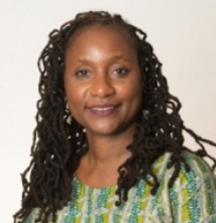
Admittedly, the next two chapters were a drudge into African-American history, but some may find it a necessity to learn or rehash historical facts as she prepares the reader to understand later chapters. After the two-chapter slog, I was back to “taking notes,” for further research on individuals and events such as on Mahommah Baquaqua, whose report is the only known document about the slave trade written by a former enslaved Brazilian and the annual “Negro Election Day,” in New England, which began in 1741 and ran into about Emancipation. The “segregated” elections were a mixture of American and African traditions.
I was moved to look more into the life of African Methodist Episcopal Bishop Henry McNeal Turner and create a meme for our Facebook page. The very popular image included his picture and an 1874 quote, which one can sing to the beat of the patriotic American song “My Country Tis of Thee”:
My country ‘tis of thee,
Dear land of Africa,
Of the we sing:
Land where our fathers died,
Land of the Negro’s pride,
From every mountain side God’s truth with ring.
My native country, thee,
Land of the Black and free,
Thy name I love
To see they rocks and rills
Thy woods and matchless hills
My hear with rapture thrills
Like that above.
Because of the meme’s popularity, I got carried away and did two other image postings from other passages from the book. The memes included quotes from Booker T. Washington and Mary McCleod Bethune. Both historical icons gave voice to their positive thoughts on what Africa meant to them, though they are not generally tagged as pan-Africanist.
“African Americans and Africa: A New History” with Dr. Nemata Blyden
Alexandria Black History Museum
902 Wythe Street
Alexandria, VA
Sat, Oct 12, 11a–1p, $5
As I read the book, I was continually grateful for Blyden’s references and biographical sketches. The sketches were so broad and immensely diverse. I am thankful for the research she conducted and her ability to synthesize all the wide-ranging stories concisely.
See Also: “Becoming Free, Becoming Black” by Alejandro de la Fuente and Ariela J. Gross. Despite similar beginnings, by the dawn of the Civil War, the social implications of blackness in Cuba, Virginia, and Louisiana were fundamentally different, resulting in dramatic shifts in the fortunes of free people of color across the Americas. The authors explore the question: When did Africans become “Blacks” in the Americas, and how did this vary by place and time and impact their freedom.
Also See: Top Colleges Take More Blacks, but Which Ones? While about 8 percent, or about 530, of Harvard's undergraduates were Black. They said that only about a third of the students were from families in which all four grandparents were born in this country, descendants of enslaved Africans.






